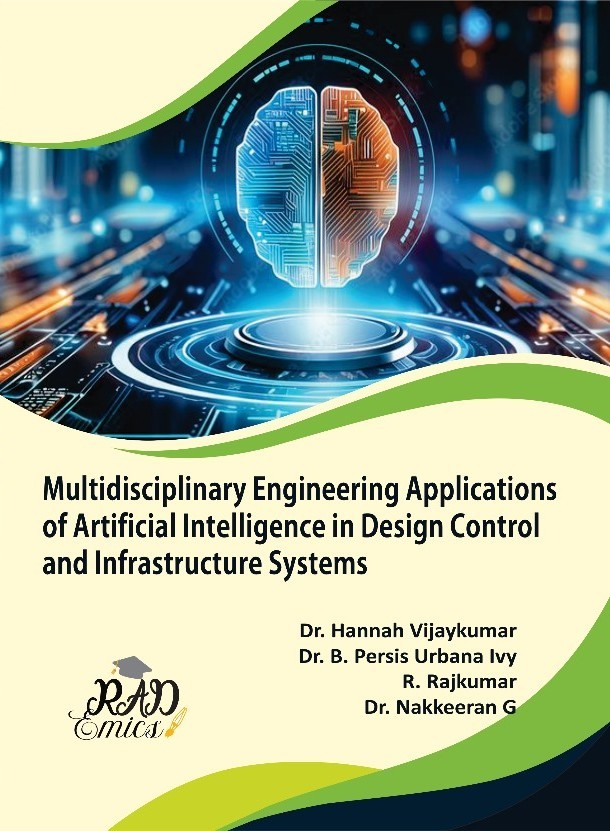
Author Name : S Mani Kuchibhatla, Harsha B K, K. Santha Sheela
Copyright: ©2025 | Pages: 36
DOI: 10.71443/9789349552609-15
Received: 26/03/2025 Accepted: 13/06/2025 Published: 06/09/2025
The increasing complexity of modern engineering projects necessitates enhanced interdisciplinary collaboration, which can be challenging due to the diverse expertise and objectives of various teams. Artificial Intelligence (AI) offers transformative potential in overcoming these barriers by providing advanced tools for data analysis, decision support, and real-time optimization. This chapter explores the integration of AI-driven frameworks to foster effective collaboration across engineering disciplines, focusing on machine learning, predictive analytics, and automation. Key applications, including AI-powered decision-making systems, collaborative design tools, and risk management strategies, are examined to demonstrate their impact on project efficiency, cost reduction, and innovation. The integration of AI not only streamlines communication but also facilitates data-driven decision-making, thereby improving the alignment of cross-disciplinary goals and enhancing overall project outcomes. Through case studies and real-world examples, this chapter provides insights into the successful deployment of AI frameworks in engineering projects across industries such as construction, aerospace, and manufacturing. Challenges in data quality, model transparency, and scalability are also discussed, alongside strategies for overcoming these obstacles. The future of AI in interdisciplinary engineering collaboration promises further advancements in intelligent systems that will continue to reshape how engineering projects are executed, enabling teams to make more informed, timely, and cohesive decisions.
The growing complexity of modern engineering projects has significantly amplified the need for interdisciplinary collaboration [1]. Projects spanning multiple domains, such as construction, aerospace, automotive, and energy, require coordination across diverse engineering disciplines, including mechanical, electrical, civil, and software engineering [2]. The diverse nature of engineering fields often creates communication barriers, conflicting objectives, and difficulties in aligning methodologies [3]. To overcome these challenges and ensure successful project delivery, there is a growing need for a unified approach that fosters efficient collaboration and decision-making [4]. Artificial Intelligence (AI) has emerged as a transformative tool in addressing these issues, offering innovative solutions to integrate interdisciplinary efforts and streamline complex project workflows. AI-driven frameworks enhance collaboration by enabling teams to work cohesively, leveraging advanced technologies like machine learning, predictive analytics, and automated decision support systems [5].
AI’s potential in collaborative engineering projects lies in its ability to process and analyze vast amounts of data from various sources, providing insights that would be otherwise impossible to derive manually [6]. In traditional project management, teams often rely on siloed data, subjective judgment, and limited predictive capabilities, which can lead to inefficiencies and delays [7]. AI algorithms, on the other hand, can combine real-time data streams from different disciplines, such as design specifications, material properties, resource availability, and environmental factors [8]. This holistic approach helps break down barriers between teams by offering a shared platform for decision-making [9]. By enhancing communication and reducing misalignments between different engineering domains, AI paves the way for more efficient, data-driven, and collaborative project execution [10].
The application of AI in decision support systems allows engineering teams to make more informed, objective decisions by analyzing trends, predicting potential risks, and optimizing resources [11]. Machine learning models, for instance, can learn from historical project data and offer predictions about future project outcomes, such as cost overruns, schedule delays, and equipment failures [12]. This predictive capability is particularly valuable in the early stages of project planning, where the ability to foresee potential obstacles can lead to more accurate timelines and budgets [13]. AI systems can help identify patterns and correlations that may not be immediately apparent to human decision-makers, enabling more effective risk management strategies [14]. With real-time data inputs, AI can provide continuous updates and alerts, ensuring that project managers are always aware of changing conditions and can adapt quickly to avoid potential issues [15].